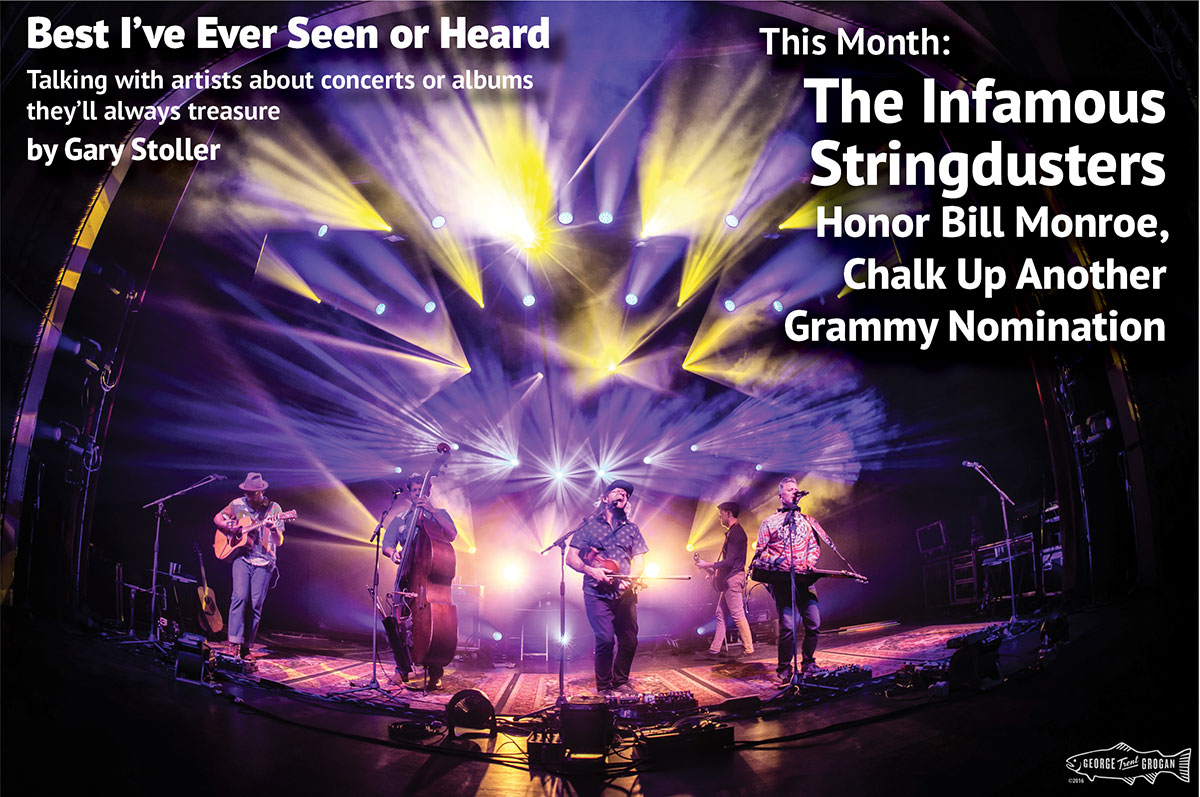
Getting a Grammy nomination last November for their Bill Monroe tribute album came out of left field for the Infamous Stringdusters.
“I think we were a bit surprised to get the Grammy nomination for this specialty project,” Andy Hall, a founding member of the band and dobro player extraordinaire, tells me. “We’re not complaining!”
Containing seven songs and less than 25 minutes of music, the Infamous Stringdusters released A Tribute to Bill Monroe in July 2021. The album not only honors the father of bluegrass but also contains some songs “directly tied to the music that shaped band members’ careers,” the group says.
“When you go back and listen to Bill Monroe, the music is still just as fresh today as it was when it was written,” Hall says. “There’s a quality to those songs and the way they’re played that’s so amazing and unique. That music is where the language of bluegrass started. We decided it was time we put our stamp on some of the classics.”
The COVID-19 pandemic necessitated recording of the tribute album at each band member’s home studio in Colorado, North Carolina and Long Island without the presence of other members. The process was similar to the recording of the group’s 2020 album Dust the Halls: An Acoustic Christmas Holiday!.
“The process is fairly simple,” explains Hall, who grew up in Binghamton, New York, and now lives in Colorado. “We layer the parts, starting usually with guitar, then the lead vocal. We add bass next and get a good rhythm track together. Then we add the melody instruments and the harmony vocals last. It’s a process that worked particularly well during 2020 when we were not getting together in person and allowed us to make music together remotely.”

The Grammy award ceremony, originally scheduled for Jan. 31, has been postponed because of the pandemic, so the Infamous Stringdusters will have to wait to see if their album captures the 2022 Best Bluegrass Album award. The competition is stiff. The other nominees for the award are Renewal by Billy Strings, My Bluegrass Heart by Béla Fleck, Cuttin’ Grass – Vol. 1 (Butcher Shoppe Sessions) by Sturgill Simpson and Music Is What I See by Rhonda Vincent.
Grammy accolades are becoming a habit for the Infamous Stringdusters. The group’s 2018 album Laws of Gravity won a Grammy for Best Bluegrass Album, and the band’s song “Magic #9” was nominated in 2010 for best Country Instrumental Performance.
This month (February 2022), the Infamous Stringdusters release their new album Toward the Fray.
“’Toward the Fray.’” a song on the album, refers to turning toward the problems we face today and not turning a blind eye,” Hall says. “And turning toward each other and not perpetuating the divide we see. Issues of racial justice, political division and climate are covered in songs on the album. We explore the idea that burying our heads in the sand is not an option and what might happen if we do. The future is in our hands!”
Some people may regard the Infamous Stringdusters and various other groups as the future of bluegrass. I ask Hall who are the best bluegrass players he has listened to.
“That’s easy,” he responds. “Although there are quite a few, I have to start at the beginning and say Bill Monroe and Earl Scruggs. They are geniuses and masters and inventors of the style. My biggest influences come from the so-called A-Team: Jerry Douglas, Tony Rice, Bela Fleck, Stuart Duncan and Sam Bush. These players redefined bluegrass, are masters of their respective instruments and a rare combination of technical mastery and creative power. I have to include Chris Thile in this mix. There are so many more, but these players represent the top for me.”
I ask Hall to name his three favorite albums of all time.
“That’s a tough question!” he answers emphatically. “Tony Rice Sings Gordon Lightfoot is way up there. Tony Rice’s playing and singing is the perfect blend of technical ability and soulfulness. Anything Tony does is amazing, but the songs on this record bring it to a new unique place. We like to call it acoustic magic — tone and melody swirling together in an amazing dance. Desert island stuff, for sure.”
Beck’s 2014 album Morning Phase has been a big influence. “It’s the most beautiful, ethereal piece of music I have ever heard,” he says. “It hits a vibe that I need lots of — extremely soft and peaceful. It’s almost like ambient music with vocals. Most music is made to wow people or get them moving. This does the opposite. It gives you space to be quiet and very reflective.”

Hall also cites Jimi Hendrix’s Band of Gypsys, a live album recorded in 1970 on New Year’s Day at New York’s Fillmore East. Hendrix had a three-piece powerhouse band with Bill Cox on bass and Buddy Miles on drums. “This one is so damn raw,” Hall says. “It’s music expression at its most passionate. Exploding suns and aliens landing in your brain.”
Hall says some early Phish concerts, including New Year’s Eve 1994 at the Boston Garden, rank as some of the best ones he has seen. But the live music that influenced him most as a musician took place in Ancramdale, New York, at the Winterhawk Bluegrass Festival (now the Grey Fox Bluegrass Festival in Oak Hill, New York) in the late 1990s. It was the first time Hall attended a bluegrass festival.
“I drove into the woods of upstate New York in July with Bill Monroe playing on the stereo and the windows down,” he recalls. “A tent, some hot dogs and beer were in the back. I was going to see the musicians I was listening to every day on CDs play live, and it was incredibly exciting. I camped, saw my bluegrass heroes play, met my bandmate Andy Falco (the Infamous Stringdusters’ guitarist) and jammed all night with him and his crew. I met a girl, got drunk, didn’t sleep and was sure I wanted to get up on that stage someday. And I did!”
